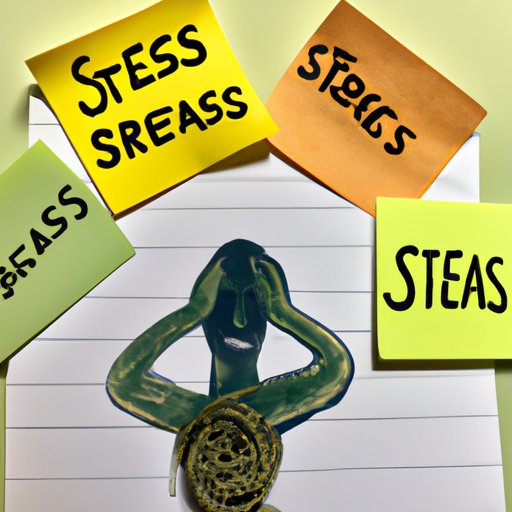
Introduction
Stress is an inevitable part of life. However, when stress becomes chronic, it can lead to major health problems, including digestive disturbances such as constipation. People experiencing stress often report gastrointestinal symptoms in addition to their other symptoms, such as headaches, nervousness and fatigue. This article explores the connection between stress and constipation and offers tips and tricks for managing these issues.
The Physiology of Stress and its Potential Impact on Digestive Health
Stress triggers a ‘flight or fight’ response in your body that can have a direct impact on your digestive system. When you are stressed, your body diverts blood and energy away from your digestive system towards the areas that are most essential in responding to the perceived danger. This means that your gut doesn’t function properly and cause a slowdown in the digestive processes. In addition, stress and anxiety can affect your gut bacteria balance, leading to further digestive issues.
Chronic stress can lead to constipation by altering the normal contractions of the colon and causing a slowdown of colonic transit time. This means that food moves more slowly through the digestive tract. Consequently, more water is absorbed from the stool, causing it to become hard, dry and difficult to pass
A look at the research on the stress-constipation link
There is a growing body of evidence supporting the link between stress and constipation. In a study published in the International Journal of Clinical and Experimental Medicine, researchers found that stress and anxiety were strongly associated with constipation.
Studies have indicated that people with chronic constipation are more likely to experience symptoms of anxiety and depression than people who don’t have constipation. Furthermore, research carried out on mice suggested that the bacteria in the gut play a crucial part in the link between stress and constipation.
Tips and Tricks for Managing Stress-Induced Constipation
There are several ways to alleviate stress-induced constipation. Relaxation techniques such as meditation, yoga and deep breathing exercises can help manage stress and, in turn, improve your digestive function. Eating a healthy diet that’s high in fiber, such as fruits, vegetables, whole grains, and nuts/seeds, and drinking plenty of water also helps keep your digestive system healthy and functioning properly. Exercise, such as walking, swimming, and running, can help get the bowels moving while reducing stress levels.
If your constipation persists despite these efforts, your doctor may prescribe medication or suggest other medical interventions. For example, laxatives and stool softeners can help reduce constipation-related discomfort such as bloating, gas, and abdominal pain.
Holistic Approaches to Stress and Constipation
Optimizing your overall health not only can keep your bowels healthy but also can help manage stress levels. One holistic approach to reducing stress is through mindfulness, which involves focusing on the present moment and becoming aware of your thoughts without judgment. Mindfulness-based therapies, such as Mindfulness-Based Stress Reduction, have been shown to reduce symptoms of anxiety, depression and improve constipation symptoms. Studies show that regular exercise can also help lower stress levels while improving gut and heart health.
When dealing with constipation induced by stress, taking herbal supplements such as senna or cascara, can relieve constipation symptoms while promoting relaxation and improving the quality of sleep. However, it is important to note that no natural remedies should be undertaken without consulting a healthcare practitioner.
Case Studies of Real People Who Have Experienced Stress-Induced Constipation
No two people experience stress the same way. This section of the article gives a personal account of real-life people who have experienced stress-induced constipation, how they coped and overcame this problem.
One such example could be Bianca, a 28-year-old woman who works long hours are a law firm. Whenever she has a deadline or a high-stress day at work, she experiences constipation. After trying different remedies at home, she consulted a gastroenterologist who recommended probiotics and digestive enzymes. She found that supplementing with these, as well as using more meditation techniques, helped her manage her stress-induced constipation in the long term.
The Link Between Stress, Constipation, and Mental Health
Addressing stress levels is crucial in managing digestive health and mental wellbeing. Mental health and gut health share an intimate connection, with studies showing that those with depression or anxiety are more likely to develop digestive issues, including constipation.
Chronic constipation can also put you at risk of developing mental health issues due to physiological changes in the brain and body. Treating underlying mental health concerns can help alleviate digestive symptoms and improve your overall quality of life.
Conclusion
The connection between stress and constipation is a growing area of research, with more studies being conducted to uncover the exact mechanisms involved. However, stress management techniques such as relaxation, exercise, healthy eating, and holistic approaches can alleviate constipation symptoms and improve overall wellbeing.
If you’re experiencing stress-induced constipation and it’s affecting your quality of life, it’s important to consult your healthcare provider to determine the best course of treatment for you.




